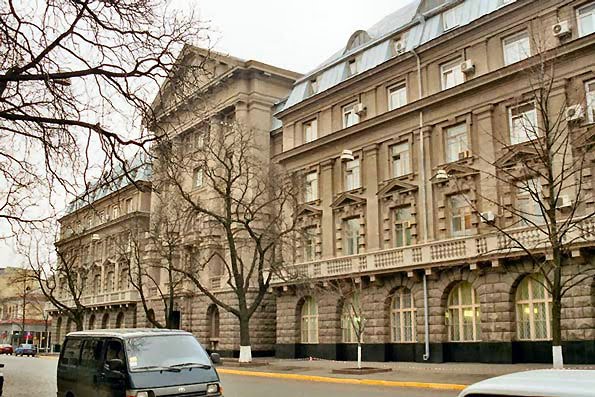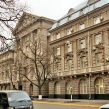
Russia Takes Control of Ukraine’s Security Forces
Publication: Eurasia Daily Monitor Volume: 9 Issue: 55
By:

The Polish newspaper Gazeta Wyborcza (March 1)
(https://wyborcza.pl/1,75248,11261360,Tajna_historia_przejmowania_Ukrainy_przez_Rosje.html) provided details of Russia’s growing grip over Ukraine’s security forces. According to Gazeta Wyborcza, then Russian Prime Minister Vladimir Putin only dropped his support for Yulia Tymoshenko in mid-2011. This came about as a consequence of two factors.
First, the criminal case against Tymoshenko removed her as a political actor and counter-weight to President Viktor Yanukovych, whom Putin did not have a high regard for. According to a US diplomatic cable, Prime Minister Putin “‘hates’ Yushchenko and has a low personal regard for Yanukovych, but apparently sees Tymoshenko as someone, perhaps not that he can trust, but with whom he can deal” (https://wikileaks.org/cable/2009/01/09KYIV208.html).
Second, Putin changed his stance after Yanukovych agreed to the introduction of Russian advisers in the Security Service (SBU) and coordination and joint consultation with Moscow over future government appointments (especially in the siloviky services). “The list of these candidates should be personally agreed by Putin,” Gazeta Wyborcza (March 1) reported.
Allegations of Russian influence in the SBU and other Ukrainian security forces have existed for the last two years (see EDM, March 18, 29, 2010; Jamestown blog, October 13, 2010). Russian citizens Igor Shuvalov and Viacheslav Zanevskyi are a case in point. Shuvalov runs “political technology” in the media for the presidential administration and Zanevskyi is the head of Yanukovych’s personal bodyguards. Foreign Minister Kostiantyn Gryshchenko and former Defense Minister Mykhailo Yezhel were lobbied by their Russian counterparts. Yezhel’s career was in the Soviet Pacific Fleet. Minister of Education Dmytro Tabachnyk was lobbied by Russian Orthodox Patriarch Kirill. Allegations of Russian and Putin’s influence over Ukraine’s security forces have been further confirmed by subsequent government re-shuffles and appointments of Russian citizens Igor Kalinin and Dmitri Salamatin as SBU Chairman and Minister of Defense, respectively.
Salamatin was born in Karaganda, Kazakhstan, spent his working career in Russia and moved to Ukraine only in 1999. He illegally holds dual citizenship and is the son-in-law of former Russian First Deputy Prime Minister Oleg Soskovets (Ukrayinskyi Tyzhden, February 17).
Salamtin was elected to parliament in the 2006 and 2007 elections as a member of the Party of Regions and in 2010-2012 headed Ukrstetsexport, Ukraine’s arms export agency. Ukraine had competed with Russia on the international arms market under Presidents Kuchma and Yushchenko but this position changed under Yanukovych when both countries’ military-industrial complexes renewed their cooperation.
Salamatin, like Kalinin, is loyal to Yanukovych and “The Family” whom they will protect and defend to stay in power. Salamatin has no experience for the position of Defense Minister and, as political expert Vadym Karasiov pointed out, was promoted with the priority of protecting the “Yanukovych regime” first and Ukraine’s interests only second (Kyiv Post, February 9).
The head of parliament’s Committee on National Defense and Security Anatoliy Grytsenko, himself Defense Minister in 2005-2007, described Salamatin’s appointment as a step backwards from military reform. “This person never once outlined and obviously has no personal understanding of the direction of reform and development of the armed forces and improvement of its combat readiness, all of which creates serious problems in the practical field” (Ukrayinska Pravda, February 8). Salamatin, as a Party of Regions deputy, never once initiated draft legislation in the field of national security (Ukrayinskyi Tyzhden, February 9).
Kalinin was born in Moscow oblast and spent his career in the Soviet KGB in Russia. Through the security service “old boys network,” he maintains close ties to Russia. Kalinin headed UDO (Directorate on State Protection), the former Soviet KGB 9th Directorate, that continues to have responsibility for protecting senior officials and is the closest Ukrainian equivalent of the US Secret Service. Two Russian citizens, Kalinin and Zanevskyi, have protected Yanukovych, which is a reflection of his paranoia and distrust of the SBU that he has never forgotten supported Yushchenko in the 2004 elections (see EDM, December 3, 2004, June 28 and October 28, 2010).
Kalinin and Zanevskyi are obligated to “The Family” whose gray cardinal is Oleksandr Yanukovych, the president’s eldest son (see EDM, December 2, 2011). During the Orange Revolution, when Kalinin held a senior position in the SBU’s Alpha spetsnaz forces, he (unlike most SBU officers) remained loyal to Yanukovych. Kalinin’s appointment will increase Russian influence in the SBU.
His appointment will also lead to enhanced cooperation between the SBU and FSB with whom they both have a “common Cheka past,” Valeriy Khoroshkovsky said (The Ukrainian Week, February 24). The FSB was expelled from the Black Sea Fleet in 2009, but a May 2010 agreement, signed a month after the ‘Kharkiv Accords’ extended the use of the Sevastopol base for the Black Sea Fleet, permitted the FSB to return to the Crimea (see EDM, May 24, 2010).
Khoroshkovsky, long regarded as a Russian agent of influence in the Yanukovych administration, moved from the SBU to briefly serve as the Finance Minister and to the important position of First Deputy Prime Minister. Khoroshkovsky was believed to be behind numerous scandals in 2010-2011, when he headed the SBU, that undermined Ukraine’s European integration. One of the scandals was the July 2010 detention of Nico Lange in Kyiv’s Borispil Airport on the eve of Yanukovych’s state visit to Germany. Lange is the Ukraine Director of the Konrad Adenauer Stiftung organization, and fellow Christian Democrat Chancellor Angela Merkel was forced to intervene on his behalf. The SBU has also added over ten additional criminal charges against Tymoshenko since her October 2011 sentence.
As head of Ukrspetsexport, Salamatin channeled all proceeds from arms exports under his personal control and the funds were paid to the Belize offshore company Primavera Financial Ltd via Cyprus-based bank accounts. “Ukrainian arms trade cash flows are now completely centralized and any foreign intermediaries have most probably been excluded. Previously a separate offshore structure was set up for every major arms export contract. This allowed several insider ‘clans’ to flourish, and was useful when supplying arms to both sides of one conflict” (https://foreignnotes.blogspot.com/2012_02_01_archive.html).
Salamatin’s actions led to the Ukrainian company Progress losing a 2008 contract worth $560 million to supply Iraq’s armed forces with 420 APCs and six An-32 aircraft. This took place because of Salamatin’s conflict with his predecessor (at Ukrspetsexport) who was responsible for ensuring the fulfillment of the contract on behalf of an American intermediary, Oleg Yankovych (Олег Янковичем) (https://nashigroshi.org/2012/01/21/rehional-vviv-belizku-monopoliyu-na-ukrajinsku-torhivlyu-zbrojeyu/). It was assumed to be logical for an American to be involved in the contract as the US had provided the funds to pay for Ukrainian weaponry to arm Iraq’s armed forces.
The appointments have removed the security forces from under the control of the oligarchs and placed them under “The Family.” “It is a sign that Yanukovych fears betrayal from within,” Karasiov says (Kyiv Post, February 9). Their primary responsibility will be to defend Yanukovych and “The Family” and ensure his re-election (see “Yanukovych Forever!” in Jamestown blog, March 6).
The strategic factor behind these appointments is the “resolution of the 2015 problem,” Ukrayinskyi Tyzhden (February 17) concluded. With Yanukovych acquiescing to Russian influence over the security forces and the opposition threatening if they come to power to annul the ‘Kharkiv Accords,’ Putin now has a personal stake in maintaining Yanukovych in power indefinitely.




